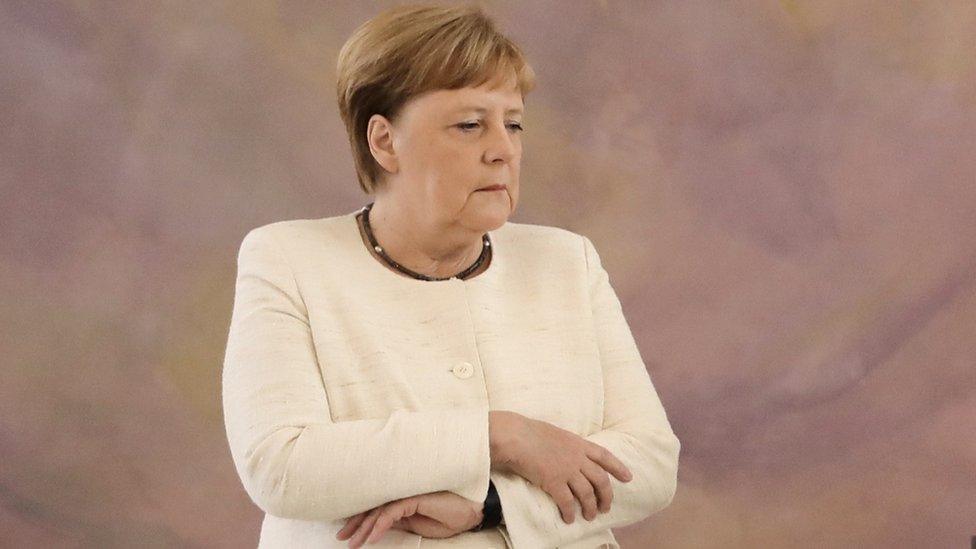Merkel: The steady woman whose shaking has touched a nation
- Published
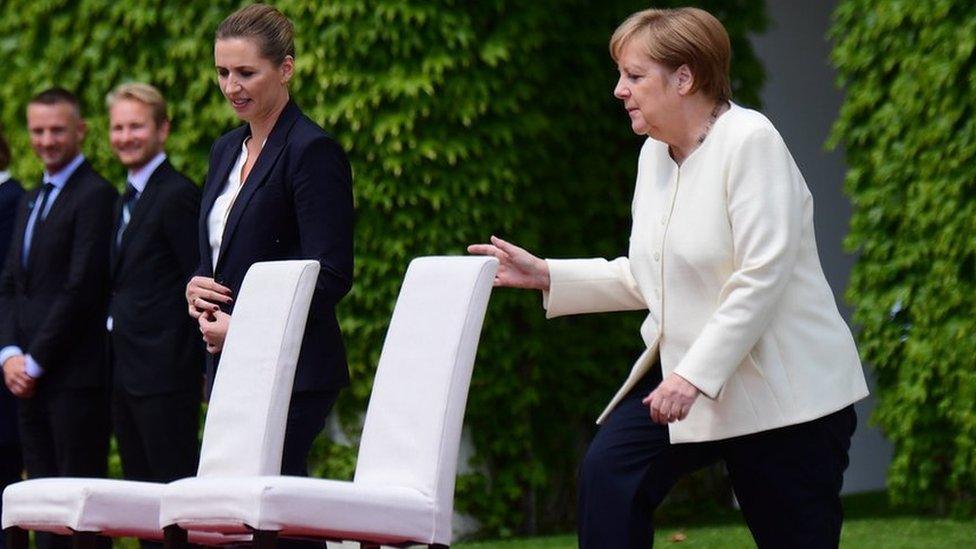
Every incident is being watched carefully for signs of illness
Angela Merkel celebrates her 65th birthday on Wednesday, but despite speculation about her health she intends to stay chancellor until the end of her current term in 2021.
A series of severe shaking incidents at official events has got Germans talking about her health. As she reaches retirement age in Germany, they are watching her closely.
Newspaper headlines have questioned whether she's fit enough to stay in office. Medical experts willing to give a diagnosis from afar are doing a brisk trade on the TV chat-show circuit.
The German chancellor celebrated her 60th birthday by attending a lecture on globalisation. For her 50th, the highlight of the party was a talk by a neuroscientist.
Maybe not everyone's idea of a good time, but they were well-publicised events. On this birthday, she might prefer to stay out of the limelight.
How the trembling attacks began
Her first bout of severe trembling came in June, when the chancellor welcomed Ukraine's new president to Berlin. There had been an earlier incident in 2017, but it was in Mexico, it was less obvious and medical checks had found nothing wrong.
Angela Merkel is seen shaking for a third time in a month
As the national anthem played, she started shaking uncontrollably. After a few minutes she recovered, and carried on the meeting as normal. Later she said it was a result of the unusually hot weather and dehydration.
Nine days later it happened again during a public event with the German president.
Last week she started trembling a third time as she welcomed Finland's prime minster to Berlin — again as the national anthem played.
I'll have to live with this for a while. But I'm very well. You don’t have to be concerned. I believe this will go the way it came. Meanwhile, I'm convinced I am fit to perform

That third incident of shaking was a psychological after-effect of the first time, explained a government spokesman, saying that the worry the trembling might recur sparked a fresh bout of shaking.
The next day, to avoid a repeat as she welcomed the Danish prime minster, both leaders sat while they listened to the national anthem, instead of standing as usual. The same thing happened with Moldova's leader on Tuesday.
Mrs Merkel has repeatedly said she feels fine, that she is perfectly capable of doing her job and that there's nothing to worry about.
Every appearance is being watched
She appears relaxed, confident and is carrying on with her usual workload. It's not clear what the cause of trembling is, or whether the chancellor even knows herself.
Now every appearance is being scrutinised for signs of illness.
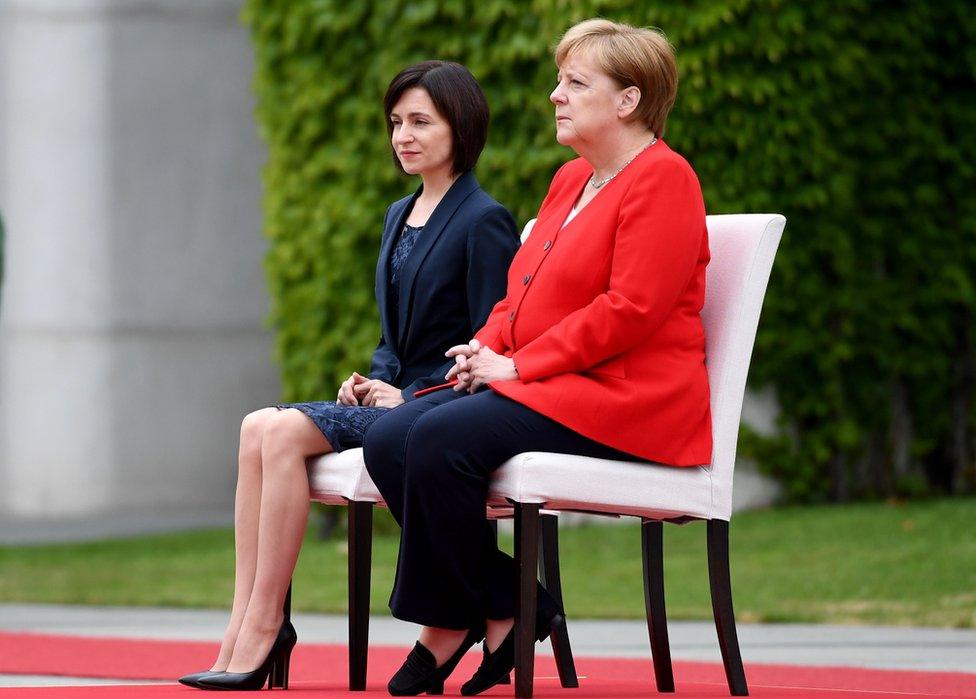
After three bouts of trembling, Mrs Merkel has taken to sitting down with visiting leaders for the national anthems
On Monday her spokesman was forced to deliver a statement about why Mrs Merkel seemed slightly breathless during a visit to Paris.
"Merkel fights to catch her breath," screamed one headline. She had rushed up some stairs to get to the press conference, it turned out.
Political opponents, spotting weakness, have piled in.
Ex-spy chief Hans-Georg Maassen, a Merkel-critic who was forced out of his role after appearing to downplay far-right violence, tweeted: "The health of the head of government is not a private matter, external. People in Germany have a right to know whether the head of government is in a position to fully carry out their duties."
Online comments from other critics of her refugee policy are more brutal, revealing a disturbing undercurrent of aggression in Germany's current political debate. The mildest call her a traitor who deserves to fall sick.
Mostly, though, German media is respectful, with many commentators adamant that the chancellor should be taken at her word and her privacy should be respected.
The majority of German voters agree. According to one survey, 59% of those polled believe Mrs Merkel does not have to reveal any information about her health. Only 34% call for a more detailed diagnosis to be made public.
Who will come next?
For many the sight of Germany's leader trembling uncontrollably is distressing to watch.
She is renowned for her discipline and endurance: the last leader standing at all-night summits.
These incidents serve as a reminder that, after 14 years leading the country, the Merkel-era is drawing to a close; and could even end sooner than expected.
Her critics would welcome that. But questions are being asked about what would happen if Europe's most powerful and longest-serving leader were suddenly unable to stay in office.
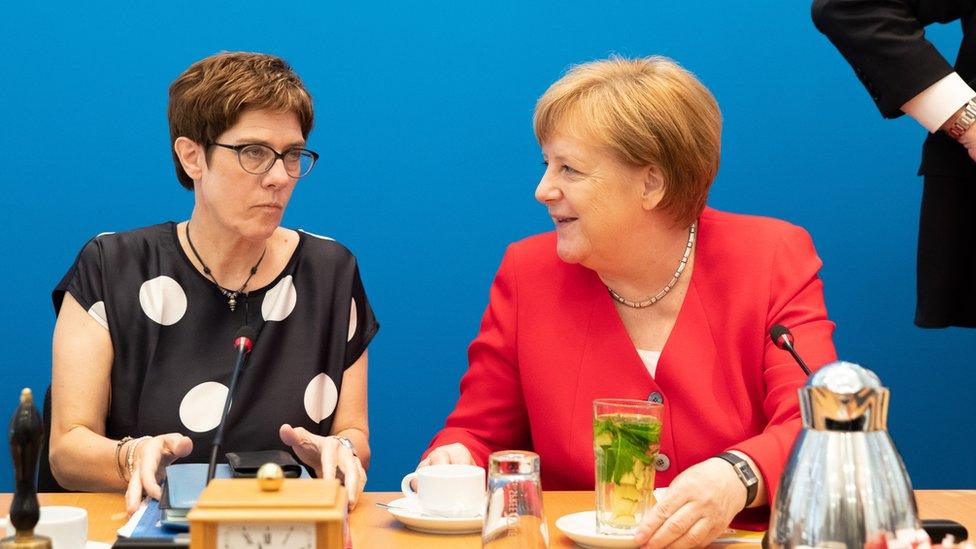
Since taking over the leadership of the CDU, Annegret Kramp-Karrenbauer has not been considered a great success
Her centre-right CDU party is riven with divisions between Merkel-like centrists and hard-line conservatives.
Her preferred successor, Annegret Kramp-Karrenbauer who now leads the CDU, has lost credibility after a number of gaffes. Her coalition-government is regularly rocked by rows, and may not last the year.
Sometimes it feels like Angela Merkel is the only constant keeping everything together.
If she were suddenly unable to stay in office, according to the constitution there is no automatic successor. The German president would name a temporary head of government until Germany's parliament could elect a new chancellor.
The debate around Mrs Merkel's health shows that even in Germany, where privacy is sacrosanct, leaders are under pressure to be more transparent.
Previous chancellors, including Helmut Schmidt and Helmut Kohl, managed to keep serious illnesses from the public.
Even the most humdrum official event Mrs Merkel attends is now being watched closely and filmed and then shared online - for signs of the slightest tremble.
Such scrutiny is not edifying. It is, though, evidence that if the shaking incidents continue, a simple "all is fine" is unlikely to be enough.
In the meantime, Mrs Merkel carries on with her usual demanding workload and has not cancelled a single appointment.
The work continues, but the pressure has increased.
- Published10 July 2019
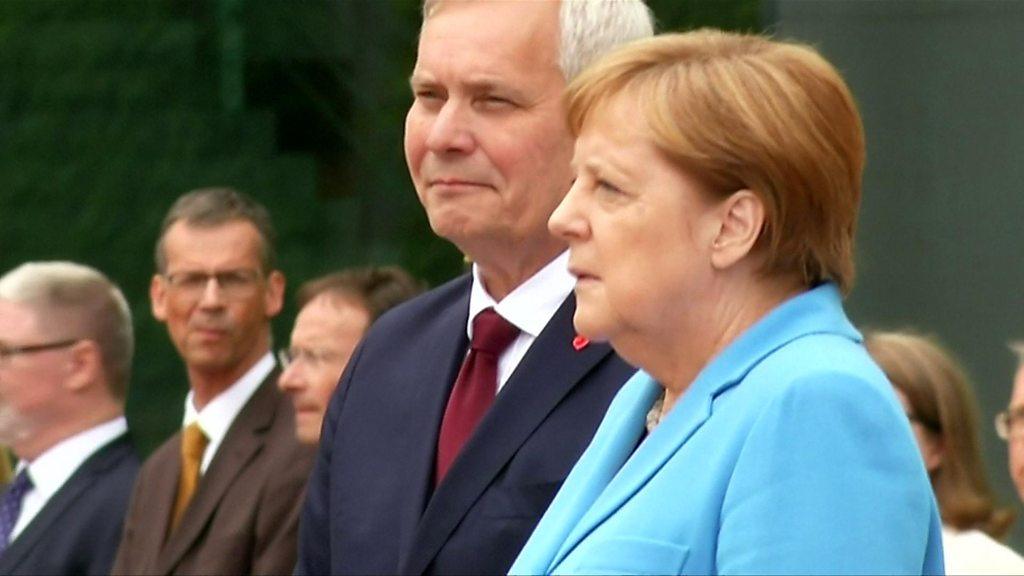
- Published28 June 2019
